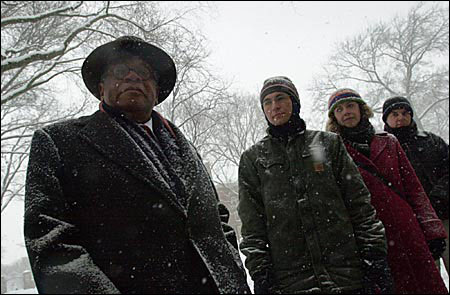Two views on the conflict in Iraq

On Jan. 13, Steven Bloomfield moderated a symposium on the war in Iraq hosted by the Weatherhead Center for International Affairs. It featured two distinguished Harvard scholars whose views on the war differ in significant ways. Stanley Hoffmann, the Paul and Catherine Buttenwieser University Professor, spoke of the “neoconservative hubris” of President Bush’s advisers, “who still have difficulty understanding why people don’t like having ‘goodness’ imposed on them from outside.”Hoffmann was also skeptical about the war’s ultimate goal of bringing peace to the region:”The idea that installing a democratic, pro-Western government in Iraq would cause democracy to spread like an oil slick over the Middle East and solve the Israeli-Palestinian conflict is an extraordinary fantasy.”Stephen Rosen, the Beton Michael Kaneb Professor of National Security and Military Affairs and director of the John M. Olin Institute for Strategic Studies, said that he supported the war in Iraq because he thought it was necessary. One reason for his support was his conviction that a new norm is emerging in international affairs that calls for nations to prevent atrocities even if it means ignoring the principle of national sovereignty.”The norm that is emerging is that states cannot commit mass murder and expect that the world will stand by and do nothing,” Rosen said.And while the search for weapons of mass destruction turned up nothing, Rosen insisted that invading Iraq to find and destroy such weapons was a legitimate aim.”The Saddam Hussein regime was judged to be too dangerous to be allowed to acquire nuclear weapons. We knew there were weapons of mass destruction. Our inspectors had seen them, touched them, counted them.”Rosen admitted that in many ways the war has been managed badly. He criticized the decision to dismantle the Iraqi army, the only institution capable of maintaining order, as well as assigning the job of rebuilding Iraq to American companies rather than putting to work the thousands of Iraqis who need jobs. But Rosen pointed out that these errors are gradually being corrected and that in time democracy will take hold. And while some have taken the intensity of the insurgency as a sign that the Iraqi people want us to leave, Rosen interprets the violence very differently:”Who are we fighting in Iraq? We are fighting people who pull young Iraqi election workers out of their cars and shoot them in the back of the head. These are not nationalists. These are people using the most brutal means to maintain dictatorial control in a country in which they are the minority – and that’s wrong.”Contacted Monday, Jan. 31, the day after the Iraqi election, which was marked by an unexpectedly high voter turnout despite threats of retaliation by the insurgents, Rosen remarked:”Before the Sunday election, critics argued that the United States had accomplished nothing in Iraq. It is hard to say that now.”Hoffmann had a similar response: “Whatever one thinks about the American invasion of Iraq, one can only rejoice at the spectacle of millions of people voting for the first time.”But he cautioned that Iraq still faces serious problems, including ongoing violence, discontent among the Sunni population, the likely emergence of a Kurdish independence movement, and discrepancies between the positions of the new delegates – many of whom are former exiles with strong American connections – and the Iraqi people.”I also believe that getting other countries to cooperate in the reconstruction of Iraq will depend on a willingness of the administration to make the American presence less visible and on announcing, if not the precise date for withdrawal, at least a clear determination to withdraw without preserving an economic and military empire,” Hoffmann said.




